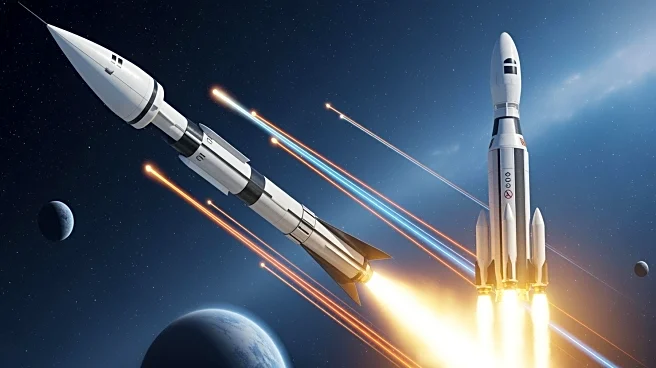What's Happening?
SpaceX's Falcon 9 rocket successfully launched from Cape Canaveral, Florida, on November 2, 2025, as part of the Bandwagon-4 rideshare mission. The mission carried 18 payloads, including experimental technologies
and satellites, into low Earth orbit. The launch was part of SpaceX's satellite-rideshare program, which aims to make space access more affordable for various stakeholders, such as universities and startups. The Falcon 9 rocket's first stage landed at Landing Zone 2 at Cape Canaveral Space Force Station, showcasing SpaceX's routine rocket landing capabilities.
Why It's Important?
The successful launch of Bandwagon-4 highlights SpaceX's role in democratizing access to space through its rideshare programs. By offering affordable launch options, SpaceX enables smaller organizations and startups to participate in space exploration and technology development. This approach fosters innovation and collaboration in the space industry, potentially leading to new scientific discoveries and technological advancements. The routine landing of Falcon 9's first stage also demonstrates SpaceX's commitment to reducing spaceflight costs and increasing launch frequency, which could accelerate the pace of space exploration and commercialization.
What's Next?
SpaceX is expected to continue its rideshare missions, providing more opportunities for diverse payloads to reach orbit. As the demand for affordable space access grows, SpaceX may expand its rideshare offerings and collaborate with more organizations. The success of Bandwagon-4 could lead to increased interest from universities and startups seeking to test new technologies in space. SpaceX's ongoing efforts to improve rocket reusability and reduce launch costs will likely drive further innovation in the space industry.
Beyond the Headlines
The expansion of rideshare programs raises questions about the long-term sustainability of increased satellite launches and their impact on space debris. As more payloads are sent into orbit, the need for effective space traffic management and debris mitigation strategies becomes crucial. Additionally, the democratization of space access may lead to ethical considerations regarding the use of space technologies and their potential impact on global communications and surveillance.











